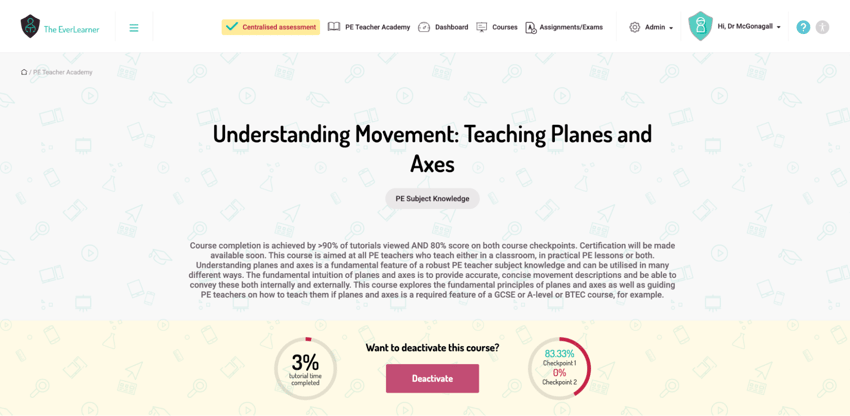Subject knowledge CPD is the key for PE and Sport teachers
Dear PE colleagues,
The blog post below was actually posted a few weeks ago, in mid-July 2025. But, since then, The EverLearner PE Teacher Academy has gone live, and I am now able to update this post with some specific examples of subject-knowledge learning that is available to PE teachers right now.
Let’s say that you are a PE teacher. Let’s say that you teach courses like GCSE, BTEC, maybe A-level. Let’s say that you also teach core PE years 7-11. Where do you go to develop subject knowledge? In my own 27-year-long PE career, the answer to a question like this has been pretty changeable. I’ve searched the internet. I’ve checked Wikipedia. I’ve looked through content on YouTube, too. I’ve also been lucky enough to be able to watch some truly great PE teachers teach. But I have never had a go-to environment where I could learn PE-specific subject knowledge reliably and efficiently. This has now changed.
As of now, PE teachers, including me (yes, I’m the author and all that, but there are many things that I need to sharpen up on over time, too), are able to develop their PE subject knowledge in a specific developmental environment.
Let’s say that you want to learn more about teaching planes and axes. You would be able to visit The PE Teacher Academy:
Search for planes and axes: And activate the course you wish to study:
And activate the course you wish to study:

Once done, the learning and assessment is available to you:
You can study the tutorials:
Making notes on the tutorial as you progress:
When you’re ready, take the checkpoint assessment:
 Receive feedback on your performance:
Receive feedback on your performance:

Learning about PE subject knowledge is, right now, at your fingertips, and I urge PE teachers to take a close look at what is available and consider enrolling.
Now, to the original blog post all about the importance of subject knowledge......
I’m having a lot of fun at work right now. Pretty much every day, I am researching and writing new courses for the brand-new PE Teacher Academy, which will be available to PE and Sport teachers no later than September 2025. The PE Teacher Academy, available exclusively to PE departments in the UK and abroad, will become the home of PE teacher CPD for now and long into the future. I wanted to bring something specific to your attention, though. As I write courses, a central concept keeps returning to my attention. That concept is the central importance of PE teacher subject knowledge as the vehicle for unlocking curriculum, pedagogical and cognitive science applications to PE teaching. Let me be clear: It is my opinion that PE teacher subject knowledge needs is the most important vehicle for improvements across the skill set of a PE teacher.
Let’s break this down: From September 2025, PE and Sport teachers can access learning in the PE Teacher Academy in five paradigms. They are:
| Curriculum | Pedagogy | Course design and assessment | Cognitive science |
Subject knowledge |
As an example, here are a couple of courses of each paradigm that will be available from September 2025:
| Curriculum | Pedagogy | Course design and assessment | Cognitive science |
Subject knowledge |
|
Introduction to teaching AQA GCSE PE Paper 1 |
Questioning Techniques in the PE Classroom 1 | Moving from Edexcel to AQA GCSE PE | Introduction to remembering and forgetting in the PE classroom | Introduction to biomechanics 1: Motion |
|
Introduction to teaching OCR A-level PE Paper 3 |
Instruction in the PE Classroom 1 |
Establishing an assessment model in the PE classroom | Introduction to Spacing & Interleaving in the PE classroom | Teaching the skeletal system 1 |
It is my belief that the final column of this offer is absolutely critical. PE and Sport teachers currently struggle to find an environment where they can truly learn the foundational principles of subject knowledge in our sector. Seriously, where can a PE teacher conveniently go to learn the core principles of skill classification, the skeletal system, biomechanics, engagement patterns or any other area of subject knowledge? Furthermore, where can a PE or Sport teacher get this reliable development that is not simply a “what you need to know”-course for any specification. You see, there’s an important detail here: Our curriculum courses will instruct PE and Sport teachers about the specific content of the BTEC Tech Award, say, but the subject knowledge courses will allow a PE or Sport teacher to truly understand their subject so that their teaching is secured for many, many future iterations of courses.
| Curriculum | Pedagogy | Course design and assessment | Cognitive science |
Subject knowledge |
|
|
Intent: |
Specification-aligned and what needs to be taught for this course |
Getting to the intuition of different concepts so that the teacher truly understands each idea | |||
|
|
Introduction to teaching AQA GCSE PE Paper 1 |
Questioning Techniques in the PE Classroom 1 | Moving from Edexcel to AQA GCSE PE | Introduction to remembering and forgetting in the PE classroom | Introduction to biomechanics 1: Motion |
|
|
Introduction to teaching OCR A-level PE Paper 3 |
Instruction in the PE Classroom 1 |
Establishing an assessment model in the PE classroom | Introduction to Spacing & Interleaving in the PE classroom | Teaching the skeletal system 1 |
There is absolutely nothing wrong with learning all about AQA GCSE PE 2016 specification, say, but this course will change. This is why subject knowledge really matters.
Another point I wish to raise is that subject knowledge unlocks the pedagogical and cognitive science behaviours of a PE and Sport teacher. This morning, I was recording tutorials all about Ebbinghaus, Thalheimer and Rosenshine for the “Introduction to remembering and forgetting in the PE classroom” course and it was critically apparent that, in order to create better conditions for remembering, teachers need to have an overarching sensitivity to the subject knowledge they are teaching. How can a PE or Sport teacher interleave instruction if they are not aware of the subtle overlap of different concepts? The answer is that they can’t. I had the same experience last week, when I was writing the course “Feedback in the PE classroom 1” and I was planning to instruct PE teachers to be highly sensitive to content-based feedback. In other words, feedback needs to be actionable, and teachers with a deep understanding of their subject will inevitably do this better.
So, here’s my vision for subject knowledge: I want you to imagine that, in 24 months’ time, you (presumably a PE or Sport teacher) could conveniently learn any subject knowledge concept via the Academy. Each course lasting about one hour, you could certificate in subject knowledge of topics as varied as our PE discipline is and do so in a way that suits you specifically. This is a wonderful aspiration, in my opinion.
Reading this article, you could get the sense that I value subject knowledge more than pedagogy, say. This is not the case. What I am arguing for here is a “subject-knowledge-first” approach and to ensure that PE and Sport teachers have, at least, the access point to learn whatever they need to learn in order to be magnificent qualification PE and sport teachers.
I endorse the PE Teacher Academy to you all and I hope that you may choose to express interest in this new way of doing things.
Thanks for reading.
James
%20Text%20(Violet).png)


